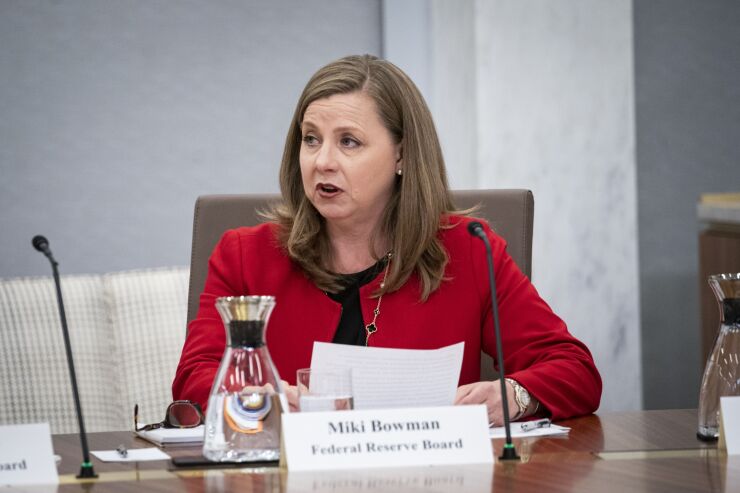
Federal Reserve Gov. Michelle Bowman said regulators have stifled innovation in the banking sector through overly restrictive policies and practices.
Bowman, who is in the running for the Fed's top bank supervisory position, said agencies should take a more "open-minded" approach to new technologies to facilitate "reasonable and supportive" experimentation.
"The natural posture of a regulator may be to emphasize safety and soundness above all other objectives, but doing so will ultimately stifle innovation and threaten the long-term health and utility of the banking system," she said during a Wednesday afternoon speech in front of the Kansas Bankers Association.
During her remarks, Bowman cited her own track record of fostering innovation, including hosting an event during her time as Kansas State Bank Commissioner on how banks could incorporate distributed ledger — commonly referred to as blockchain — technology into their business.
She said regulators should get to know the tradeoffs within new technologies before taking steps to curb their usage.
"We must prioritize understanding the risks and benefits of new technologies before developing a supervisory posture, especially when applying rules and using the 'soft' power of supervision to discourage its use," she said.
During his first term in office, President Donald Trump appointed Bowman to the Fed Board of Governors in 2018 and again in 2019, securing her a full 14-year term that runs until 2034.
Throughout her tenure — though especially during the latter part of the Biden administration — Bowman has frequently weighed in on regulatory matters. She opposed the new capital and long-term debt requirements proposed by Fed Vice Chair of Supervision Michael Barr and other agency heads, and has frequently championed regulatory tailoring, to ensure the strictest oversight is reserved for the largest banks.
Barr has pledged to
During her speech Wednesday, Bowman reiterated her concern about
"Bank regulatory policy should address the needs of the unbanked and expand the availability of banking services," she said. "It should not be used to limit or exclude access to banking services for legitimate customers and businesses in a way that is meant to further unrelated policy goals."
Bowman also highlighted concerns about the functioning of the Treasuries market and the potential unintended consequences of the current bank regulatory framework. Specifically, she pointed to the inclusion of Treasuries in the supplemental leverage ratio, or SLR — which establishes a minimum level of capital based — as a potential disruption to the marketplace's lack of liquidity.
While Bowman has raised concerns about the SLR and other capital standards in the past, her calls for action to address these matters were more pointed than usual.
"Where we can take proactive regulatory measures to ensure that primary dealers have adequate balance sheet capacity to intermediate Treasury markets, we should do so," she said. "This could include amending the leverage ratio and G-SIB surcharge regulations for the largest U.S. banks. Adopting regulatory changes to mitigate these concerns may not be sufficient to ensure market liquidity, but it would be an important step toward building resiliency in advance of future stress events."






